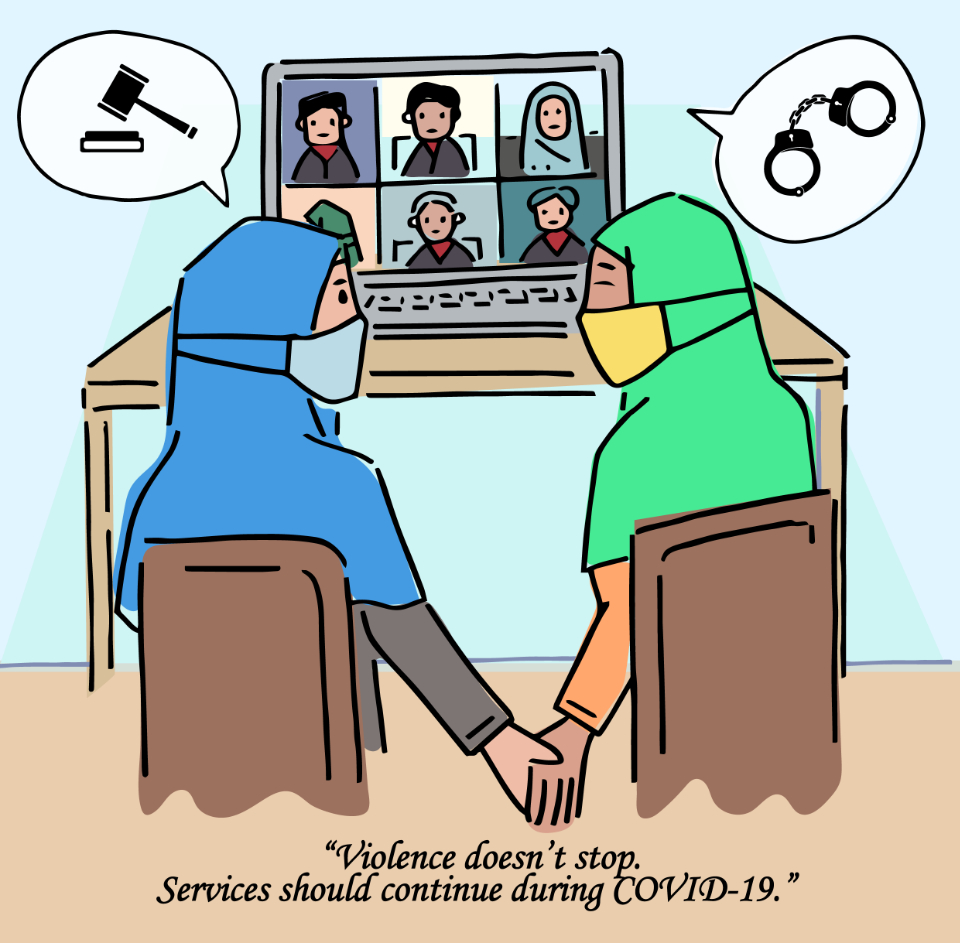“Violence doesn’t stop. Services should continue during COVID-19.”
Interview with Karmila Jusup, social worker at the Pasundan-Durebang Women’s Crisis Centre in Bandung, West Java, IndonesiaDate:

Pasundan-Durebang Women’s Crisis Centre is a civil society organization for survivors of violence against women, including returnee migrant workers. The Centre runs a shelter for survivors, support emergency cases, provide legal and psychological counselling services and organize trainings to empower survivors of violence.
Karmila: I manage the shelter, supporting survivors of violence against women, including women migrant workers at the Pasundan-Durebang Women’s Crisis Center in Bandung. The shelter is my workplace and the place where I live. Every day is different based on who we need to support that day. If we have a survivor of trafficking, then it could start with picking up the survivor at the Jakarta airport. If we have a survivor of violence who is being transferred to our shelter, then it might start with picking up the survivor from a centre in another province. The day could also involve providing remote support to women migrant workers in destination countries, a psychological assessment for a new survivor such as counselling, assisting with filing a case of domestic violence to the police or any other support services.
However, all our usual work has changed completely since the COVID-19 pandemic started. There are health protocols to control the spread of the virus, and shelters are expected to enact social distancing. The immediate impact of this measure is that the shelter has to decrease the number of survivors in the shelter, can accommodate fewer people than before while the number of violence cases is increasing during the pandemic. The newly arriving survivors must undergo a rapid test to check if they are infected with COVID-19, and if the test is positive, I have to accompany the survivor to take the full test. There was one case where a new survivor tested positive for COVID-19. While I supported the survivor to get the COVID-19 treatment, I also had to make sure the survivors who were already in the shelter were quarantined properly.
Not just receiving survivors, but the whole case management has been affected by COVID-19. For instance, even though trials are conducted online, that doesn’t mean we can attend the trials from the shelter. We are asked to go to the prosecutor’s office if we wish to continue the trial process. This means, of course, that we should have masks and gloves, and we have to find a private car as most of the public transportation stopped operating during COVID-19. All these additional measures have led to an increased cost per case. Moreover, there are some services that cannot be done virtually, such as picking up survivors. Limited health services have made it difficult to support women who need medical care, especially those who are pregnant.
The COVID-19 pandemic has created a new challenge for women migrant workers. There were cases of women migrant workers who returned home and experienced emotional violence from their family members as they are no longer contributing income to their families. Economic difficulties have been very common among women migrant workers.
The workload has been enormous for us, and it has been difficult to find new volunteers who are willing to join us, as many potential volunteers are afraid of contracting COVID-19. But, violence does not stop. In fact, it is increasing. This means that more survivors need support from our shelter, at the same time as we are supposed to decrease the number of survivors residing here, work with fewer volunteers and manage increased costs. The support from the Safe and Fair Programme was truly timely and critical for us to keep the shelter open.
You may wonder how I can continue working despite all these challenges. It is not an easy time for any of us. However, there are survivors who need my support. They face risks of violence and exploitation, and some of them could be in critical life-and-death situations. I believe in justice for all of them and the right to live a decent life free from violence. When survivors who I supported feel happy and express their rights, I no longer feel stressed.
If I could make a wish, I want a strong commitment from my government to respond to the needs of survivors of exploitation, violence and trafficking, including our Indonesian women migrant who are working abroad or who have come back home, and who contribute so much to Indonesian society. We need a better, comprehensive and gender-sensitive political structure for women migrant workers with resources to implement it.
The ILO-UN Women programme “Safe and Fair: Realizing women migrant workers’ rights and opportunities in the ASEAN region”, under the global EU-UN Spotlight Initiative to eliminate violence against women and girls, supports front-line service providers to ensure essential services are available for women migrant workers who are subject to violence. More: www.spotlightinitiative.org/safe-and-fair
If you or someone you know has experienced violence against women in Bandung, West Java, Indonesia, contact Pasundan-Durebang Women’s Crisis Center for support
- Helpline: +62 812-2282-3427
- Messenger: https://www.facebook.com/Pasundan-Durebang-Womens-Crisis-Center/
- Email: pasundandurebang@gmail.com
More contacts of service providers are available in the Service Directory for Women Migrant Workers in the ASEAN region: https://bit.ly/services4wmw
Interviewed by Nunik Nurjanah
Written by Younghwa Choi
Edited by Gihan Hassanein